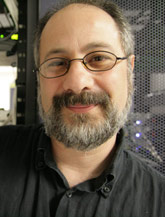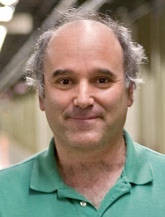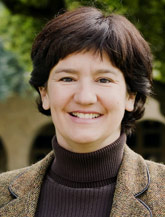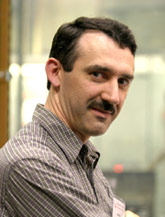
Handy Links
SLAC News Center
SLAC Today
- Subscribe
- Archives: Feb 2006-May 20, 2011
- Archives: May 23, 2011 and later
- Submit Feedback or Story Ideas
- About SLAC Today
SLAC News
Lab News
- Interactions
- Lightsources.org
- ILC NewsLine
- Int'l Science Grid This Week
- Fermilab Today
- Berkeley Lab News
- @brookhaven TODAY
- DOE Pulse
- CERN Courier
- DESY inForm
- US / LHC
SLAC Links
- Emergency
- Safety
- Policy Repository
- Site Entry Form

- Site Maps
- M & O Review
- Computing Status & Calendar
- SLAC Colloquium
- SLACspeak
- SLACspace
- SLAC Logo
- Café Menu
- Flea Market
- Web E-mail
- Marguerite Shuttle
- Discount Commuter Passes
-
Award Reporting Form
- SPIRES
- SciDoc
- Activity Groups
- Library
Stanford
Around the Bay
SLAC Physicists Honored as APS Fellows
Four SLAC physicists have been named American Physical Society fellows this year. Accelerator physicists John Fox and Andrei Seryi were honored during a special award ceremony for new APS fellows at the 2009 Particle Accelerator Conference in Vancouver last week. Stanford Institute for Materials and Energy Science physicists Thomas Devereaux and Kam Moler were also named fellows this year, at an award ceremony at the APS March Meeting in Pittsburgh.
The APS elects less than half of one percent of its membership annually to fellowship, which it calls "a distinct honor, signifying recognition by one's professional peers."
"It's a great honor to receive an award like this because it comes from your colleagues nationally and internationally and reflects contributions that have benefited so many labs," said Fox, who has worked on accelerators at SLAC in their many incarnations, from SPEAR to PEP-II. Fox has also worked on Berkeley Lab's Advanced Light Source, the Italian phi-factory, DAFNE and the Japanese B factory, KEKB. Currently collaborating with CERN on instabilities anticipated in the Large Hadron Collider, Fox is also an enthusiastic teacher and won the Stanford Dean's Award for Distinguished Teaching in 2001. "I'm especially appreciative of the students I have had, who have taught me so much," he said.
Seryi plays a key role in SLAC's contributions to the planned International Linear Collider. He leads work on the design of the ILC's beam delivery system and serves as deputy spokesperson for the Accelerator Test Facility collaboration, which runs the ILC testbed ATF2 in Japan. Seryi is also the project leader for SLAC's new Facility for Advanced Accelerator Experimental Tests, or FACET.
"I am happy that I was able to contribute to the development of linear colliders, and delighted to be recognized by the physics community for these contributions," Seryi said. "I hope to see the work of so many colleagues from many institutions worldwide realized in the future with the ILC."
SIMES physicist Devereaux uses computational models to untangle how properties like superconductivity emerge from systems of interacting electrons. Since arriving at SLAC in the fall of 2007, he has built a computational photon spectroscopy group, who simulate how unusual phenomena would look if examined with X-ray spectroscopy. He directs the X-ray science and techniques program at SIMES, and has worked very closely with a wide array of experimental and theoretical groups. "I was very honored to be included in this group of outstanding recipients this year, which included a few friends and collaborators," Devereaux said. "We had a very nice celebration in Pittsburgh."
His SIMES colleague Moler heads a group of post-doctoral researchers, graduate students, and undergraduates who are developing innovative tools for examining the magnetic landscapes of materials on tiny scales. Her experiments shed light on how electrons lose their quantum-mechanical wave-like nature at temperatures a few degrees above absolute zero, and length scales longer than several nanometers. Additionally, her probing of superconducting materials with special magnetic tools has helped elucidate the physics underlying this strange phenomenon.
"The great thing about being an APS Fellow is knowing that the physics community values my work," Moler said.
SLAC boasts a significant number of APS fellows; since 1995, about 30 SLAC scientists have been elected.
—Lauren Schenkman
SLAC Today, May 15, 2009

| Thomas Devereaux | Citation: For significant contributions to the theories of inelastic light scattering and angle-resolved photoemission spectroscopies in strongly correlated systems. |

| John Fox | Citation: For leadership in developing instrumentation and instability control systems for colliders and light sources, for applying control formalism to accelerator problems, and for developing novel beam instruments and new formalisms. |

| Kam Moler | Citation: For important developments in scanning SQUID microscopies, and for their pioneering applications to unconventional and mesoscopic superconductivity. |

| Andrei Seryi | Citation: For his leadership in developing beam delivery systems for linear colliders and his contributions to the theory of ground motion, vibration, and feedback for accelerators and particularly linear colliders |